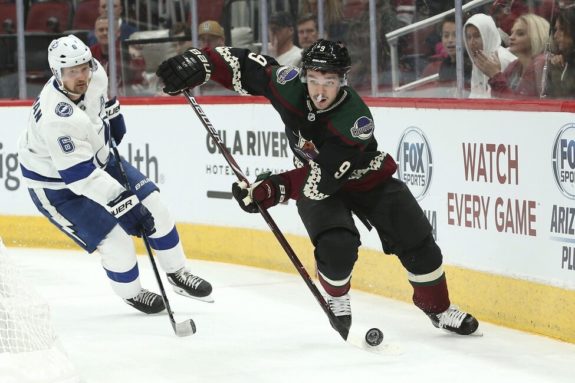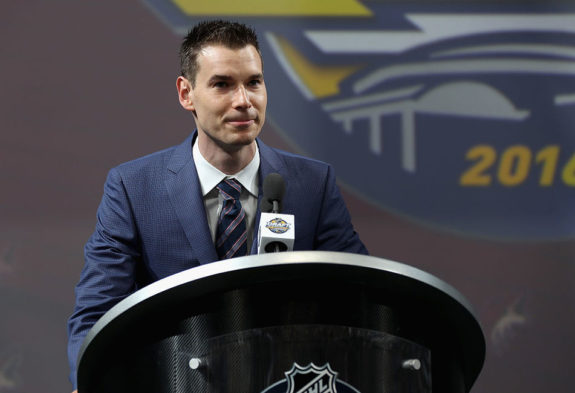After a relatively uneventful summer on the restricted free agent front, the hockey world finally received the news of a significant RFA signing on Wednesday afternoon.
No, it wasn’t news of Mitch Marner finally ending his stalemate with the Toronto Maple Leafs and general manager Kyle Dubas. It wasn’t news of Patrik Laine inking his long-awaited extension with the Winnipeg Jets, either.
In fact, it wasn’t even news involving a player from this year’s RFA class.
No, it was 21-year-old Clayton Keller who received the big payday, as he and the Arizona Coyotes agreed to an eight-year, $57.2 million contract extensionwith an average annual value of $7.15 million.

The contract, which will kick in prior to the 2020-21 season, will make Keller the Coyotes’ second-highest-paid player, behind only captain Oliver Ekman-Larsson.
Stability in Arizona
For general manager John Chayka, the Keller signing is just the latest in a series of moves that has provided some clarity to the club’s future and direction. In addition to Keller, the Coyotes also have Nick Schmaltz, Christian Dvorak, Jakob Chychrun and Ekman-Larsson signed through at least the 2024-25 season. Each player, except for Ekman-Larsson, is under the age of 23, giving the Coyotes some roster stability that they’ve lacked in recent years.
The Coyotes have seen so much roster turnover as of late that Ekman-Larsson and Brad Richardson are the only remaining players from Arizona’s 2015-16 club, which first took the ice less than four years ago.

Obviously, a lot of roster turnover has taken place in the ~1,200 days since the 2015-16 season came to an end, but the long-term signings of Keller, Schmaltz, Dvorak, Chychrun, and Ekman-Larsson should help alleviate some of the constant change the franchise has seen in recent years.
Is Keller Worth It?
Following the news of Keller’s contract extension, there was, as typically occurs when Arizona makes a transaction, a lot of negative talk about the Coyotes, specifically regarding the possibility that they overpaid their young star forward. While some valid points have been made, these arguments will likely be squashed once the season gets started in October.
As a rookie in 2017-18, Keller led the Coyotes in scoring with 23 goals and 42 assists for a total of 65 points, and he garnered Calder Trophy consideration while doing so, finishing a distant third in the voting behind winner Mathew Barzal and Vancouver Canucks’ phenom Brock Boeser.
In his second NHL effort, the St. Louis native took a step back, as many players do during their sophomore seasons, but Keller still led Arizona in scoring with 14 goals to go with 33 assists.
For those keeping score at home, Keller has played two full NHL seasons, and has led Arizona in scoring during both campaigns.
There’s not much more the franchise could have hoped for from their 2016 seventh-overall selection as he starts his NHL career.

Keller’s 47-point 2018-19 season, along with his 65-point rookie effort, plus the two points he chipped in during limited action in 2016-17, give him 114 points in 167 career games.
Keller’s 0.68 points per game (P/GP) average since making his debut puts him in some pretty solid company – he’s scored at a higher rate than players like Nikolaj Ehlers, William Nylander, and Kevin Hayes, among others, since making his debut, and he’s at least two years younger than each of those three NHLers.
Keller is only going to get better from here, and that’s what Arizona was betting on when they doled out an eight-year extension to a player entering the final season of his entry-level deal.

The Coyotes easily could have waited until next summer to get this signing done. However, if Keller has the hugely successful third season that many in Arizona are expecting, especially if he plays alongside Phil Kessel and Nick Schmaltz, it’s probable that Chayka would have had to shell out significantly more than the $7.15 million per year that Keller received on his new deal.
Additionally, by signing Keller now, the Coyotes will avoid potential drama next summer. As we previously mentioned, some high-profile young players still remain without a contract, even with training camp right around the corner.
The Coyotes won’t have to worry about protracted contract negotiations with any of their key young players next summer, and Keller can use his newfound financial stability to focus solely on playing hockey.
It’s a win for both parties.